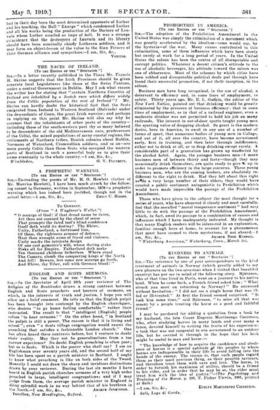PROHIBITION IN AMERICA.
(To THE Eorroa or ran " SPECTATOR.") Sra, 7be adoption of the Prohibition Amendment in the United States was simply the culmination of a movement which was greatly accelerated by the idealism—some would say, by the hysteria—of the war. Many causes contributed to this culmination, some of them influences which have been slowly but surely at work for a long period of years. In the United States the saloon has been the centre of all disreputable and corrupt politics. Whatever a decent citizen's attitude to the use of alcoholic beverages, his attitude toward the saloon was one of abhorrence. Most of the schemes by which cities have been robbed and disreputable political deals put through have found their successful promotion, if not their inception, in GIs saloon.
Business men have long recognized, in the use of alcohol, a deterrent to efficiency and, in some lines of employment, to safety. Thirty years ago, Mr. E. L, Godkin, the editor of the New Tort Nation, pointed out that drinking would be greatly eliminated by the pressure of business efficiency: that in some lines of employment, as in that of a railroad engineer, even a moderate drinker was not permitted to hold his job on many railroads. The interest in out-of-door sports taught young men the sporting value of dropping alcohol. So great is the modern desire, here in America, to excel in any one of a number of forms of sport, that numerous bodies of young men in College, and out of it, all over the country, have become accustomed early, first in training, and then later through indifferenCe. either not to drink at all, or to drop drinking except rarely. A considerable part of a generation has grown up unaffected by the alcohol habit. Again, the younger business men—I mean business men of between thirty and forty—though they may occasionally drink themselves, are quite ready to give ft up in order to promote efficiency in the large concerns. These young business men, who are the coming leaders, are absolutely in- different to the right to drink. Had they felt about this right asffilo a very large number of their elders, they would have created a public sentiment antagonistic to Prohibition which would have made impossible the passage of the Prohibition Amendment.
Those who have given to the subject the most thought for a series of years, who have observed it closely and most carefully, feel that the so-called "moral temperance sentiment" bad very little to do with the passage of the Prohibition Amendment, which, in fact, owed its passage to a combination of causes and influences which I have inadequately indicated. My thought is that many English readers will be interested in an explanation, familiar enough hero at home, to account for a phenomenon that must have seemed to them mysterious, if not absurd.—I
"Waterbury American," 1Vaterbury, Conn., March 1st.


































 Previous page
Previous page